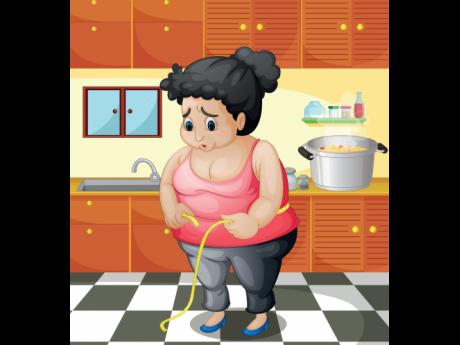Dr Alfred Dawes | Combating obesity with bariatric surgery - Part I
Suppose you had a medical condition that could result in you dying anywhere from five to 20 years earlier than you normally would have? You went to a doctor, and he told you he had a treatment guaranteed to work four per cent of the time. Would you be ok with that?
Well, that disease is morbid obesity and the prescribed treatment is how we currently treat obesity - telling patients to lose weight by eating 'right' and exercising.
The current approach has been shown in one study to result in successfully losing 20 per cent of body weight and keeping it off for 10 years at a rate of about four per cent. Yet, we continue to give obese patients the same advice and send them off with pills to an early grave.
We often speak of the obesity epidemic and lump overweight and obesity together. However, being overweight and morbidly obese are completely different entities. Morbid obesity describes having a body mass index of greater than 40.
It is morbid obesity that studies have shown to have the highest failure rate with lifestyle changes such as diet and exercise. It is unfortunately this group of high BMI individuals who are most likely to suffer from diabetes, hypertension and other lifestyle diseases.
Whereas being overweight is, in most instances, a relatively easily reversible result of calories consumed being greater than calories burnt, morbid obesity is associated with metabolic changes in the body that are designed to keep the fat on and to sabotage any attempt at fat loss by the individual.
OBESITY IS NO JOKE
Obesity is no joke. It is a disease much like diabetes and hypertension. When you are morbidly obese, your risk of dying is increased. You are prone to diabetes, heart disease, cancer, strokes, amputations, respiratory problems, arthritis, circulation problems, blood clots, depression, complications after surgery and trauma, and many other health issues.
Morbidly obese persons take more sick days from work and spend more on healthcare than normal BMI individuals. The global cost of obesity is over $2 trillion per year.
It is estimated that the treatment of obesity and obesity related diseases costs approximately three per cent of Jamaica's GDP annually. To combat obesity, we need to incorporate one of the best weapons in our armamentarium, bariatric surgery.
Bariatric surgery involves reducing the size of the stomach and/or rerouting the path the food takes in our gastrointestinal tract. The result is a decrease in the total calories ingested and absorbed. When we look at the labels on our food, we see the nutrients as a percentage of the recommended daily allowance of 2,000 cal per day.
However, in reality most of us eat way more than 2,000 cal per day. Americans on average eat approximately 3,600 cal per day, which is equivalent to about a pound of fat. Jamaicans on average consume about 2,700 cal per day.
After bariatric surgery it is common for the patients to absorb approximately 800 to 1,000 cal per day. Under normal circumstances, we would not be able to sustain this in the long term because of the sensation of hunger and cravings. This in addition to our natural tendency to overeat when food is available.
PATIENT DOES NOT FEEL AS HUNGRY AS BEFORE
Post-bariatric surgery, the patient does not feel as hungry as before. In some procedures, the part of the stomach that produces hunger hormones is removed and with it the sensation of hunger coming from the stomach. So with bariatric surgery you are able to eat very small amounts and feel full.
Bariatric surgery will, however, not cure the Jamaican sensation of feeling peckish. Eating a small number of calories puts the patient in a calorie deficit as their daily requirements continue to exceed the ingested calories. They lose weight rapidly and continue to lose weight until their bodies make the adjustments with the metabolic rate and energy requirements to match the intake of calories. At that point, they hit a new balance and the weight loss stops, although they are still eating tiny amounts of food.
MORE THAN JUST A PROCEDURE; IT IS A LIFESTYLE CHANGE
Bariatric surgery is more than just a procedure; it is a lifestyle change. Whenever patients ask about surgery, I spend the majority of the time speaking about the bariatric lifestyle. Ingesting small amounts of food for the rest of your life is not easy.
There will be cravings and temptations. There will be days when the patient will become frustrated with not being able to eat more of the food they enjoy. The person who wants bariatric surgery has to be the one who is ready to give up pleasures from eating larger portions of food in order to enjoy all the benefits that come with sustained with weight loss. The bariatric patient will still be able to eat different types of foods but in smaller portions. Overeating will result in vomiting and sometimes abdominal pain.
Surgery is not a cop out or a quick fix. It is a choice to make a lifestyle change and to stick to that commitment because you have a powerful tool allowing you to see oftentimes unbelievable results.
The major difference between surgery and other lifestyle changes is that its success rate is about that of the failure rate of other diets in the long term.
With an over 90 per cent success rate for bariatric surgery, it is hard to see why we should choose the alternative with an over 90 per cent failure rate. Maybe it is thinking like that why we have an obesity epidemic in the first place.
- Dr Alfred Dawes is a general laparoscopic and weight loss surgeon at the Island Laparoscopy and Medical Care. Email: info@islandlaparoscopy.com; yourhealth@gleanerjm.com.

